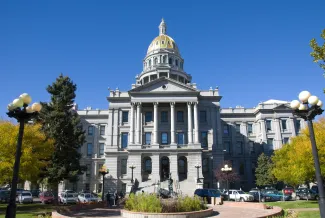
Spikes in emergency visits during Colorado bad air days cost $1.14 billion in 2019
Click play to listen to this article.
(Colorado News Connection) Colorado lawmakers are digging into the health and economic impacts of the state's poor air quality from wildfire smoke and ozone pollution created by oil and gas operations and tailpipes.
Senator Lisa Cutter, D-Lakewood, pointed to a new study showing bad air days are sending more Coloradans to the emergency room.
"Air pollutants have a really significant impact on the health of Coloradans, and we have the data to back it up," Cutter emphasized. "We also learned that our most vulnerable populations were impacted the most, and that's children under 18 and adults over 65."

Colorado Capitol Building Denver © iStock - kuosumo
In 2019, three quarters of counties affected by wildfire smoke saw an increase in emergency room visits. More people also sought emergency care during high ozone pollution days. The price tag for these ER visits: $1.4 billion.
Colorado has failed to meet Environmental Protection Agency ozone pollution standards for years and this past summer, the state violated ozone limits on 40 days, a near record. Wildfire seasons are projected to get longer in coming years and Cutter argued it is important to understand what's at stake for public health.
"We do know that there are increasing wildfires, in number and in intensity," Cutter noted. "It's largely because of climate change."
Recommendations from the Center for Improving Value in Health Care report included beefing up resources for emergency rooms in high-risk areas and making sure the state's most vulnerable residents can stay safe on bad air days. Cutter recently introduced legislation aiming to improve wildfire prevention and mitigation strategies. She stressed it is important to create policies to help build resiliency.
"Let's try to mitigate the impacts, with all the health issues and the poor air quality," Cutter urged. "But at the same time, let's prepare to deal with the things that we really know are going to keep happening."

















